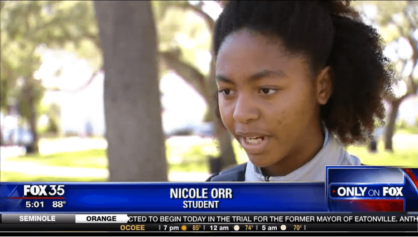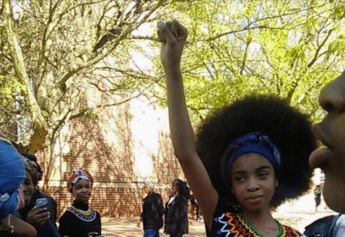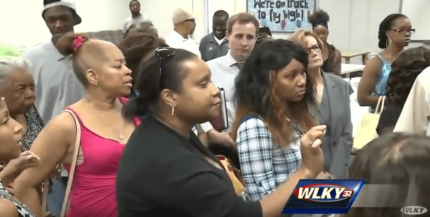A Kentucky high school has banned natural Black hairstyles and one parent is leading a call to action to have the dress code reviewed. State House candidate Attica Scott revealed Butler Traditional High School’s hair policy in a tweet posted Wednesday evening. Her daughter had just arrived home from registration and was unhappy with the regulations.
https://twitter.com/atticascott/status/758434510887346177
The dress code has several policies that particularly call attention to African-American hair. Some also pertain to boys’ afros.
Hair must be clean and neat with a tapered side/back and at a reasonable length.
• Hair styles that are extreme, distracting or attention-getting will not be permitted. This includes unnatural hair colors or obvious intentions to draw attention to oneself.
• Males may not dye, tint or highlight their hair.
• Reasonable length for males means hair no longer than the top of the shirt collar, above the eyebrows and afros no more than 2 inches in length.
• There must be no designs, names or lines cut into the hair and no tails or buns on males.
• No dreadlocks, cornrolls [sic], twists, mohawks, no jewelry will be worn in the hair.
• One straight line is permissible to be cut into the hair for a part. No braids will be allowed on males.
• No facial hair (except mustaches or goatees) is allowed. Sideburns may not extend past bottom of ear lobe.
Scott and her daughter Ashanti – who will attend Butler as a sophomore in the fall – are especially concerned with the rule against dreads, twists and “cornrolls” – referring to the cornrow style of braiding.
“I felt disrespected because it said clean and neat hair and it made me feel like, maybe my hair isn’t clean,” Ashanti said at a press conference yesterday.
“The last thing that we need to be doing is saying, ‘you can’t be you, you can’t express your culture, you can’t express your heritage, ” Attica told reporters. “We want you to be like your white teachers and the white administration that we have at this school and your white classmates who have not had the same life experience as you.”
“It’s about policing our kids’ hair. I don’t want our kids’ hair to be policed. They’re already policed enough,” she added.
After Attica tweeted the rules Wednesday, many others have slammed the school’s policy.
@AshleeEats pointed out the offensive spelling error along with the entire policy.
Don't know what offends me more: the policy or "cornrolls."
— Cowboy Clark (@AshleeEats) July 28, 2016
April said the code was an example of enduring racism.
For anyone who still doesn't recognize that racism is alive and well in 2016. Get your head out of the sand! https://t.co/aM9ASl5Vet
— April (@KyWildViolet) July 28, 2016
Janielle Samuel surmised the school simply did not want Black students to attend.
So basically this school doesn't want African American kids to attend here. @rolandsmartin #JCPS @JCPSKY @BTHS_Bears https://t.co/vztu7OuRL3
— Jan Jan (@gingajan) July 28, 2016
Attica also won support from community leaders.
John Marshall, Jefferson County Public Schools’ chief equity officer tweeted photos of his daughters sporting natural hair styles.
https://twitter.com/jdm1906/status/758609514518151168
Kentucky’s American Civil Liberties Union also backed the State Representative elect.
Singling out culturally specific hairstyles may send a signal to students of color that their very being is a distraction in the classroom
— ACLU of Kentucky (@ACLUofKY) July 28, 2016
“I don’t understand why we’re going to focus on something like natural hair styles when we should be focused on education,” Attica told the Courier-Journal. “They specifically outlined hairstyles that are worn most by Black kids. To me, this stinks of institutional racism.”
Butler High’s decision-making council, which is in charge of the dress code policy among other things, is set to hold a special meeting today as a result.
“It’s a policy that’s been in place, JCPS Superintendent Donna Hargens said in a statement Thursday. “It’s not a new policy, and we appreciate that the concern has been brought to our attention because our board of education is adamant in its policies about being inclusive.”
“We will provide guidance to our schools to ensure their policies are not obtrusive, do not conflict with board policy and most importantly do not infringe on the many cultures embraced across our school district,” Hargens added mentioning all system schools were “encouraged” to review their dress codes.


